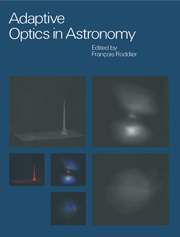Book contents
- Frontmatter
- Contents
- List of contributors
- Part one Introductory background
- Part two The design of an adaptive optics system
- 3 Theoretical aspects
- 4 Wave-front compensation devices
- 5 Wave-front sensors
- 6 Control techniques
- 7 Performance estimation and system modeling
- Part three Adaptive optics with natural guide stars
- Part four Adaptive optics with laser beacons
- Part five The impact of adaptive optics in astronomy
- Glossary of acronyms
- Index
3 - Theoretical aspects
from Part two - The design of an adaptive optics system
Published online by Cambridge University Press: 23 November 2009
- Frontmatter
- Contents
- List of contributors
- Part one Introductory background
- Part two The design of an adaptive optics system
- 3 Theoretical aspects
- 4 Wave-front compensation devices
- 5 Wave-front sensors
- 6 Control techniques
- 7 Performance estimation and system modeling
- Part three Adaptive optics with natural guide stars
- Part four Adaptive optics with laser beacons
- Part five The impact of adaptive optics in astronomy
- Glossary of acronyms
- Index
Summary
The principles of adaptive optics
In this chapter, we consider AO systems in general, mostly regardless of any practical implementation. An AO system basically consists of three main components, a wave-front corrector, a wave-front sensor, and a control system. They operate in a closed feedback loop. The wave-front corrector first compensates for the distortions of the incoming wave fronts. Then part of the light is diverted toward the wave-front sensor to estimate the residual aberrations which remain to be compensated. The control system uses the wave-front sensor signals to update the control signals applied to the wave-front corrector. As the incoming wave-front evolves, these operations are repeated indefinitely.
A key aspect of adaptive optics is the need for a ‘guide’ source to sense the wave front. Bright point sources work best. Fortunately, nature provides astronomers with many point sources in the sky, in the form of stars. However, they are quite faint. With current systems, observations are limited to the vicinity of the brightest stars, that is a few percent of the sky. Wave-front sensing is also possible with extended, but preferably small sources, provided they are bright enough. This includes not only solar system objects such as asteroids, or satellites of the main planets, but also a few galaxy cores, and small nebulosities. A whole chapter of this book is devoted to the problem of solar observations (Chapter 10). Another to the creation of artificial guide sources with laser beacons (Chapter 12).
- Type
- Chapter
- Information
- Adaptive Optics in Astronomy , pp. 25 - 56Publisher: Cambridge University PressPrint publication year: 1999
- 1
- Cited by



